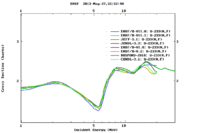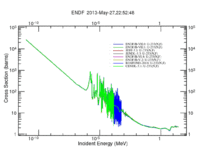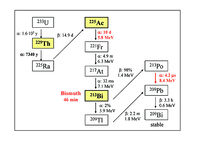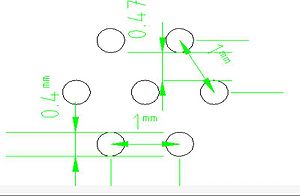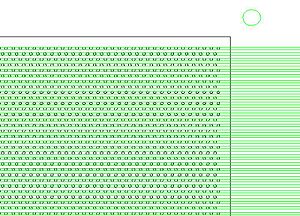Difference between revisions of "Neutron TGEM Detector Abdel"
| Line 128: | Line 128: | ||
The signal of the detector is observed as the shutter is open and close. | The signal of the detector is observed as the shutter is open and close. | ||
| + | |||
| + | {| border="1" cellpadding="4" | ||
| + | |- | ||
| + | | shutter close || [[File: GEM_close.jpg | 40 px]] | ||
=References= | =References= | ||
Revision as of 13:01, 3 July 2013
THGEM#9 Counting Experiment test 1/4/13
GEM alpha-Beta detector counter
GEM Alpha-Beta detector counter
GEM gain data graphs and GEM Calibration
U-233 fission x-section data
What is the energy distribution of Beta and Photon from U-233
Gamma distribution for U-233 and its daughters are in metioned in details in the documents , File:U233 day gamma.pdf <ref>http://www.radiochemistry.org/periodictable/gamma_spectra , Wed. 04/10/2013</ref>
The energy range of the emitted gamma is shown in the following table .
| nuclide | Energy Minimum | Energy Maximum (keV) |
| U-233 | 25 | 1,119 |
| Ra-225 | 40 | 40 |
| Ac-225 | 10.5 | 758.9 |
| Fr-221 | 96.8 | 410.7 |
| At-217 | 140 | 593.1 |
| Bi-213 | 323.81 | 1,119.4 |
Negative beta particles are emitted mainly from U-233 daughters as shown in the figure <ref> http://itu.jrc.ec.europa.eu/index.php?id=204, Wed. 04/10/2013 </ref>
Insert energy distribution for Betas
The following table shows the negative beta emitter nuclides,their parent nuclides, and their half lives:
| Nuclides | energy (MeV) | half life |
| 0.357 | 14d. | |
| 1.426 | 46min. | |
| 1.981 | 2.2 min. | |
| 0.644 | 3.25h | |
| 1.893 | stable |
What is the energy distribution after the 1 mm FR4 shutter
electron shutter penetration
The energy distribution below represents the incidence electron on a 1 mm FR4 shutter.
graph of electron energy for electron penetrating shutter (did any not penetrate?, how many?)
photons below were produced by above incident electron?
The energy distribution of photons was observed on the opposite side of the shutter
Electrons (with least energy from U-233= 0.2 MeV) pass through the shutter have the energy distribution below.
alpha shutter penetration
photons
Number of ions produced from Beta and Photon in ArCo2
EMTest10 is used to calculate the average number of ions (electrons) when a 101 beta of 1 MeV are fired in a world that contains ArCO2. (13.5 per primary electron).
Time to observe the GEM signal
In the case of triple GEM detector with a gas flow of 0.3 SCFH and 2650V and 2950V on GEM cards and cathode successively, a signal lower than the noise (of 16 mV and amplified twice) is observed at 770.0s +/- 0.1.
The normal rate (8 MHz +/- 2 as measured by the oscilloscope) is observed after 952.9s +/- 0.1.
THGEM card tasks and tests
- New THGEM cards
Two new fully machined cards are going to be tested in air and ArCH4, if they passes 2000 V potential bwtween the top and the bottom, then they are going to be installed in ArCh4 gas chamber.
The older THGEM cards will have a high voltage enough to have one spark/min to clean impurities or surface defects.
GEM Signal after the latest modification on the fission chamber 07/01/13
The signal of the detector is observed as the shutter is open and close.
| shutter close | ReferencesTHGEM designTHGEM#9 Media:Shalem_MSthesis_march2005.pdf
Electric field Simulation
File:THGEM Efield simulation.pdf
File:THGEM 2009 design gas efficiency.pdf
Voss and 3 russian references for Dy(n,x) cross sections
http://arxiv.org/abs/0903.3819 Dy photon gammas spectrum
http://www.americanelements.com/thoxst.html http://arxiv.org/pdf/physics/0404119 NIM_A535_2004_93[1]
Neutron cross sections for different elements Media:Neutron_cross_sections.pdf http://www-nds.iaea.org/RIPL-2/ Media:n gamma cross sections at 25 keV.jpg Media:n alpha cross section at 14.2 MeV.jpg Media:ne cross section at 14 MeV.jpg Media:high enegy fission x-section.jpg Media:N_gamma_x-section_at_400_keV.jpg Media:x-sections of reactions at 14 MeV.jpg Media:n p x-section at 14.3MeV.jpg Media: n gamma x-section at 14.5 MeV.jpg Media: elastic x-section at 0.5 MeV.jpg Media: n gamma x-section at 1 MeV.jpg Media: n 2n x-section at 14.3 MeV.jpg Donald James Hughes, Neutron cross sections, 2nd edition 1958, u.s.a atomic energy commission.Media:Neutron cross sections.pdf File:NSAE 151 2005 319-334 Y.D. Lee.pdf TGEM-2009 File:TGEM 2009.pdf 12 Volt power supply system. http://www.lnf.infn.it/esperimenti/imagem/doc/NIMA_46128.pdf http://electrontube.com.Media: rp097mono HV divier.pdf http://www.cerac.com/pubs/proddata/thf4.htm#anchor550078 http://en.wikipedia.org/wiki/PC_board GEANT4_Paticles_Models[2] Resistors online store : http://www.justradios.com/rescart.html RETGEMsMedia:Jinst8_02_p02012_THGEM_spark.pdf
Media:Mauro micro pattern gaseuos detectors.pdf Media:Development and First Tests of GEM-Like Detectors With Resistive Electrodes.pdf http://www.supplydivision.co.uk/genitem.htm Thick_GEM_versus_thin_GEM_in_two_phase_argon_avalanche_detectors (HV circuit)[3] Stainless Steel deflection [4] Data Sheetsradioactive surface cleaner NoCount MDSD File:Radioactive surface cleaner.pdf. Th-Xsection referencesFile:Th-232 fxsection Behrens 0.7-1.4MeV.pdf File:Th-232 fxsection Blons 1975 1.2-1.8MeV.pdf File:Th-232 fxsection ermagambetov 0-3MeV.pdf File:Th-232 fxsection Henkel 0-9MeV.pdf File:Th-232 fxsection Ohsawa original.pdf File:Th-232 fxsection pankratov 3-35MeV.pdf File:Th-232 fxsection protopopov distancefromthesource.pdf File:Th-232 fxsection rago 12.5-18MeV.pdf U-238-Xsection and coating referencesrelative cross section and calibration samples characteristics for a well determined number of fissions per second File:Eismont relative absolute nf induced intermediate energy.pdf
INTERNATIONAL EVALUATION OF NEUTRON CROSS-SECTION STANDARDS, INTERNATIONAL ATOMIC ENERGY AGENCY,VIENNA, 2007 File:U238-xsection.pdf U_238 (0.5-4MeV) and Th_232 (1-6MeV) fission cross section with statistical error.File:Th-232 U238 xsetion data ebars.txt
Thorium CoatingThF4 target for sputtering coatings http://www.cerac.com/pubs/proddata/thf4.htm Machining UraniumUranium will ignite in powder form
http://cat.inist.fr/?aModele=afficheN&cpsidt=16864172 Calorimeters/Detectors: DU sheet is in wide-scale use as an absorber material in high-energy physics research at large accelerator laboratories. The high atomic number and density of DU presents a large number of atoms per unit volume to interact with the particles emerging from collisions in these detectors. Also the slight background radiation from DU enables in situ calibration of the electronic read out devices within such detectors, thereby improving the accuracy of measurement. http://www.2spi.com/catalog/chem/depleted-uranium-products.html
Warren_logbook[9]
Related To Gaseous DetectorsBreakdown and Detector Failure (10/21/10)
1- A. Bressan, M. Hocha : NIM A 424 (1999) 321—342 File:High rate behavior and discharge limits in micro-pattern detectors .pdf 2- Fonte and Peskov IEEE 1999 :File:Fundamental limitations of high rate gaseous detectors.pdf 3- B. Schmidt: NIM A 419 (1998) 230—238 File:Microstrip gas chambers Recent developments radiation damage.pdf Ideas1.) Can we mix resistive paste (Encre MINICO) with TH-232. We construct a "bed of nails" to place a predrilled G-10 board with a copper border. The nails fill in the holes of the G-10 to keep the paste out. Ecre MINICO is a resistive paste used for transistors. a.) Get some resistive paste.
Resistive glue to compare
http://www.ellsworth.com/conformal.html?tab=Products http://www.ellsworth.com/display/productdetail.html?productid=764&Tab=Products
http://www.cotronics.com/vo/cotr/ea_electricalresistant.htm
c.) construct bed of 0.4 mm nails. Look for 0.4 mm diameter pins. 7/31/2009New vendor for carbon paste. http://www.electrapolymers.com/productItem.asp?id=33 The data sheet does not show any information about the thickness of the paste. The company has a distributor in the usa (877)-867-9668. A phone call is expected on Sat. 8/3/2009 about the availability of the product. TGEM Mask DesignCoating U-238 or Th-232 is essential for neutron detection in the range 2-14 MeV, but THGEM contains holes that should be protected from any coating material. So, a mask is designed to cover these holes. The holes are in drilled to be on the corners of hexagonal of 1mm side length as in the figure:
Please look at the following files for more details: Make number bold black font. Add color so it is clear that they are holes in a material. P_DPerformance of THGEM as a Neutron Detector VendorThick Film Screen Printershttp://www.sciquip.com/browses/browse_Cat.asp?Category=Screen+Printers http://www.marubeni-sunnyvale.com/screen_printing.html
tektronix oscilloscope134.50.3.73
<references/> |
